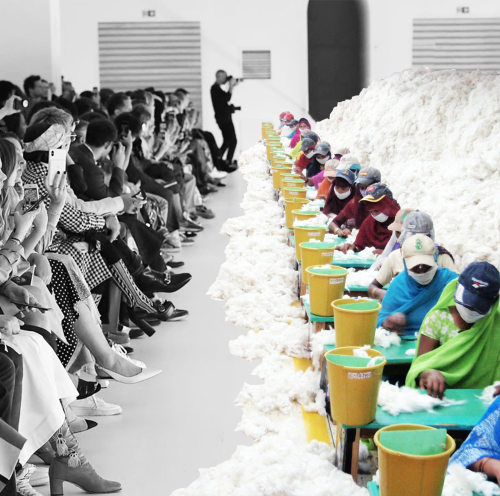Fashion Revolution Week is an annual global campaign that brings together the most significant fashion activism movement, with teams in more than 90 countries worldwide, for a week of action commemorating the anniversary of the Rana Plaza factory collapse.
Running from 18-24 April, the campaign aims to inspire global citizens to collectively work towards a regenerative, restorative, and revolutionary new fashion system that is equitable.

This year, Fashion Revolution Week 2022 will be calling attention to the mainstream fashion industry's exploitation of labour and natural resources with the theme “MONEY, FASHION, POWER”. Wealth and power are concentrated in the hands of a few, and growth and profit are rewarded above everything. Much of the fashion industry trades on a culture of disposal and waste and manipulate consumers into a toxic cycle of overconsumption. Meanwhile, most people who make our clothes do not receive adequate wages to meet their basic needs and already suffer from the consequences of climate change driven by the fashion industry.
“As we enter our ninth year, we will go back to our core, exposing the profound inequities and social and environmental abuses in the fashion supply chains. From the uneven distribution of profits to overproduced, easily discarded fashion, to the imbalances of power that negate inclusion. On the other hand, inspiring new designers, thinkers, and professionals worldwide is challenging the system with solutions and alternative models. Fashion Revolution Week is all of this, scrutinising and celebrating fashion, globally and locally, wherever you are,” said Orsola de Castro, Co-founder and Global Creative Director at Fashion Revolution.
Fashion Revolution Week will lay the groundwork for new laws on living wages for those who make our clothes, encourage brands to stop focusing on growth and profit, as well as challenge consumers to scrutinise what they buy.
Tools will be provided for people to write to their local policymaker about these concerns, call for greater transparency in the fashion supply chain, support innovative small businesses and create their own fashion love stories to reconnect with the clothes they wear daily.






